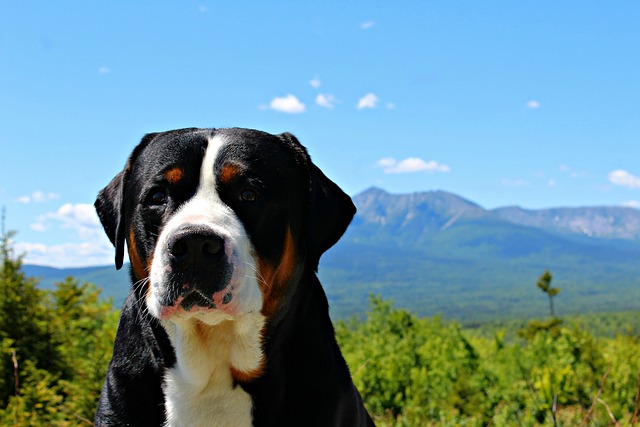


The Greater Swiss Mountain Dog, also known as the "Swissy," is a large, powerful, and agile working dog breed that was originally bred in the Swiss Alps. Known for their strength, intelligence, and loyalty, these dogs were traditionally used as farm dogs, herding livestock, and pulling carts. Despite their imposing size, Greater Swiss Mountain Dogs are gentle, affectionate, and good-natured with their families, making them excellent companions for active households.
The Greater Swiss Mountain Dog's origins date back over 2,000 years to the ancient Roman Empire, where they were used as guard and herding dogs. The breed was developed in Switzerland, where they were primarily used for herding cattle, pulling carts, and guarding farmsteads. Although they nearly went extinct in the early 20th century, dedicated breeders helped revive the breed in the 1900s. Today, the Greater Swiss Mountain Dog is recognized for its versatility as a working dog and its affectionate nature as a family pet.
The Greater Swiss Mountain Dog is a large and muscular breed, standing between 23 and 28 inches tall at the shoulder and weighing between 85 to 140 pounds. They have a short, thick, and tri-colored coat, typically featuring a black base with white and rust-colored markings. Their coat is dense enough to protect them from harsh weather conditions, and they have strong, broad shoulders and a deep chest. Their ears are triangular and flop down, and their eyes are almond-shaped, usually dark brown. Their tail is thick and carried low but may be raised when they are alert or excited.
Despite their large size, Greater Swiss Mountain Dogs are known for their gentle and calm temperament. They are typically affectionate with their families, loyal to their owners, and good with children and other pets. They are social dogs that enjoy being part of family activities and are often described as "gentle giants." However, they can be reserved or protective around strangers, making them good watchdogs. They tend to be independent and may have a strong instinct to protect their home, but they are not usually aggressive unless provoked.
Greater Swiss Mountain Dogs are an active breed that requires regular exercise to stay healthy and happy. They were originally bred for working in the mountains, so they have a lot of energy and stamina. Daily walks, hikes, and play sessions are essential to meet their physical and mental needs. They enjoy activities like running and hiking, and they make excellent companions for outdoor enthusiasts. Although they are generally adaptable to apartment living, they require enough space to move around and need plenty of exercise to avoid becoming bored or restless.
Greater Swiss Mountain Dogs are intelligent and eager to please, which makes them relatively easy to train. However, due to their independent nature, they can be a bit stubborn at times, so consistent, positive reinforcement training methods work best. Early socialization is essential to help them develop good manners and become well-adjusted adults. Exposing them to different people, animals, and environments while they are young helps them grow into confident and balanced dogs. Their natural guarding instincts mean they may be cautious around strangers, so early socialization also helps them distinguish between normal and threatening situations.
Greater Swiss Mountain Dogs are generally healthy, but like many large breeds, they can be prone to certain health conditions. Common concerns include hip and elbow dysplasia, bloat (gastric torsion), and certain heart conditions. Regular vet check-ups, a healthy diet, and maintaining an ideal weight can help mitigate some of these risks. Their short coat is relatively low-maintenance, but they do shed moderately, especially during shedding season. Brushing once or twice a week helps manage their shedding and keeps their coat healthy. They are also prone to ear infections, so it's important to check and clean their ears regularly.
The average lifespan of a Greater Swiss Mountain Dog is between 8 and 11 years. Due to their large size, they generally have a shorter lifespan than smaller breeds. With proper care, including regular exercise, a balanced diet, and routine veterinary visits, they can live a full and healthy life. Genetics, health screenings, and overall care can play a significant role in ensuring a long and healthy life for this breed.
© copyright Dog Compendium 2024 - 2026